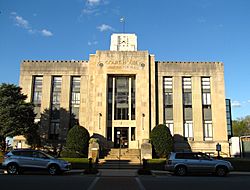Winchester, Tennessee facts for kids
Quick facts for kids
Winchester, Tennessee
|
|
|---|---|

Franklin County Courthouse in Winchester
|
|

Location of Winchester in Franklin County, Tennessee.
|
|
| Country | United States |
| State | Tennessee |
| County | Franklin |
| Established | 1810 |
| Incorporated | 1821 |
| Named for | James Winchester |
| Area | |
| • Total | 11.71 sq mi (30.33 km2) |
| • Land | 10.72 sq mi (27.78 km2) |
| • Water | 0.99 sq mi (2.55 km2) |
| Elevation | 974 ft (297 m) |
| Population
(2020)
|
|
| • Total | 9,375 |
| • Density | 874.13/sq mi (337.50/km2) |
| Time zone | UTC-6 (Central (CST)) |
| • Summer (DST) | UTC-5 (CDT) |
| ZIP code |
37398
|
| Area code(s) | 931 |
| FIPS code | 47-81080 |
| GNIS feature ID | 1274848 |
Winchester is a city in Tennessee, located in Franklin County. It's the main town, or county seat, of Franklin County. Winchester is also part of the larger Winchester micropolitan area. In 2020, about 9,375 people lived there.
Contents
A Look Back: Winchester's History
Winchester became the official center for Franklin County on November 22, 1809. The town was planned out the very next year. It was named after James Winchester. He was a soldier in the American Revolution and a general in the War of 1812. Even though the town is named after him, James Winchester never actually lived there. The famous Hundred Oaks Castle is also in Winchester.
Early Schools and Learning Centers
In 1851, Mary Sharp College was started by Z. C. Graves and the Baptist Church. It was first called the "Tennessee and Alabama Female Institute." Later, it was renamed to honor Mary Corn Sharp, who was a generous donor. This was a college for women, but it offered a very strong education. It taught subjects similar to those at well-known universities like Amherst College and Brown University. Mary Sharp College closed in 1896.
During the 1800s, Winchester was a hub for education. Other private schools in the city included:
- Carrick Academy for boys (started in 1809)
- Winchester Female Academy for girls (started in 1835)
- Winchester Normal College
Winchester During the Civil War
During the American Civil War, Winchester was first held by Confederate soldiers. Then, Union troops took control. Before the rest of Tennessee officially left the Union, Winchester and Franklin County had already done so. They even unofficially joined Alabama for a short time. In 1863, the Confederate Army of Tennessee passed through Winchester while retreating to Chattanooga.
Recreation and Tims Ford Lake
Fun activities in Winchester got a big boost in 1966. That's when the Tennessee Valley Authority began building the Tims Ford Dam. This dam was built on the Elk River. The project was finished in 1972. Now, Tims Ford Lake is a popular spot. It's known for great boating and bass fishing. Tims Ford State Park is also located along the lake's edge.
Winchester's Location and Surroundings
Winchester is located a bit north of the center of Franklin County, Tennessee. It shares a border to the north with the city of Decherd. The main part of Winchester is just south of Boiling Fork Creek. This creek is now part of Tims Ford Lake. On the western side of the city, Dry Creek also forms an arm of the lake. Winchester's city limits reach the Elk River arm of the lake. This is about 4 miles (6 km) north of downtown.
Major Roads and Travel
Several important roads pass through or near Winchester:
- U.S. Route 41A goes through the center of town. It leads east 6 miles (10 km) to Cowan and 12 miles (19 km) to Sewanee. It also goes north 6 miles (10 km) to Estill Springs and 14 miles (23 km) to Tullahoma.
- Tennessee State Route 16 heads southwest from downtown. It leads 19 miles (31 km) to the Alabama border.
- U.S. Route 64 goes around Winchester to the south and east. It leads northeast 16 miles (26 km) to Interstate 24 near Pelham. It also goes west 32 miles (51 km) to Fayetteville.
- Tennessee State Route 50 goes west and northwest from Winchester. It leads 20 miles (32 km) to Lynchburg.
- Tennessee State Route 130 goes northwest 6 miles (10 km) to Winchester Springs and 16 miles (26 km) to Tullahoma.
The United States Census Bureau says Winchester covers about 11.7 square miles (30.3 square kilometers). Most of this area is land, but about 0.99 square miles (2.6 square kilometers) is water.
Winchester's Climate
| Climate data for Winchester, Tennessee (5 miles southeast) (1991–2020 normals, extremes 1985–2023) | |||||||||||||
|---|---|---|---|---|---|---|---|---|---|---|---|---|---|
| Month | Jan | Feb | Mar | Apr | May | Jun | Jul | Aug | Sep | Oct | Nov | Dec | Year |
| Record high °F (°C) | 77 (25) |
80 (27) |
85 (29) |
89 (32) |
95 (35) |
104 (40) |
105 (41) |
103 (39) |
99 (37) |
94 (34) |
86 (30) |
76 (24) |
105 (41) |
| Mean daily maximum °F (°C) | 48.9 (9.4) |
53.1 (11.7) |
61.4 (16.3) |
70.8 (21.6) |
78.1 (25.6) |
84.6 (29.2) |
87.3 (30.7) |
87.1 (30.6) |
82.0 (27.8) |
72.0 (22.2) |
60.5 (15.8) |
51.8 (11.0) |
69.8 (21.0) |
| Daily mean °F (°C) | 39.5 (4.2) |
43.1 (6.2) |
50.5 (10.3) |
59.1 (15.1) |
67.1 (19.5) |
74.4 (23.6) |
77.6 (25.3) |
76.8 (24.9) |
71.0 (21.7) |
60.2 (15.7) |
49.2 (9.6) |
42.4 (5.8) |
59.2 (15.1) |
| Mean daily minimum °F (°C) | 30.2 (−1.0) |
33.1 (0.6) |
39.7 (4.3) |
47.4 (8.6) |
56.1 (13.4) |
64.1 (17.8) |
67.9 (19.9) |
66.4 (19.1) |
60.0 (15.6) |
48.5 (9.2) |
38.0 (3.3) |
33.1 (0.6) |
48.7 (9.3) |
| Record low °F (°C) | −2 (−19) |
4 (−16) |
8 (−13) |
22 (−6) |
31 (−1) |
44 (7) |
52 (11) |
48 (9) |
36 (2) |
23 (−5) |
13 (−11) |
−5 (−21) |
−5 (−21) |
| Average precipitation inches (mm) | 4.78 (121) |
5.40 (137) |
5.76 (146) |
5.06 (129) |
4.77 (121) |
5.20 (132) |
4.68 (119) |
3.91 (99) |
4.27 (108) |
3.43 (87) |
4.66 (118) |
5.75 (146) |
57.67 (1,465) |
| Average snowfall inches (cm) | 1.4 (3.6) |
1.0 (2.5) |
1.0 (2.5) |
0.0 (0.0) |
0.0 (0.0) |
0.0 (0.0) |
0.0 (0.0) |
0.0 (0.0) |
0.0 (0.0) |
0.0 (0.0) |
0.0 (0.0) |
0.7 (1.8) |
4.1 (10) |
| Average precipitation days (≥ 0.01 in) | 11.5 | 11.9 | 12.0 | 10.8 | 11.3 | 12.1 | 11.2 | 9.7 | 7.9 | 8.0 | 9.4 | 12.4 | 128.2 |
| Average snowy days (≥ 0.1 in) | 1.1 | 1.3 | 0.7 | 0.0 | 0.0 | 0.0 | 0.0 | 0.0 | 0.0 | 0.0 | 0.0 | 0.6 | 3.7 |
| Source: NOAA | |||||||||||||
People of Winchester
| Historical population | |||
|---|---|---|---|
| Census | Pop. | %± | |
| 1880 | 1,039 | — | |
| 1890 | 1,313 | 26.4% | |
| 1900 | 1,338 | 1.9% | |
| 1910 | 1,351 | 1.0% | |
| 1920 | 2,203 | 63.1% | |
| 1930 | 2,210 | 0.3% | |
| 1940 | 2,760 | 24.9% | |
| 1950 | 3,974 | 44.0% | |
| 1960 | 4,760 | 19.8% | |
| 1970 | 5,256 | 10.4% | |
| 1980 | 5,821 | 10.7% | |
| 1990 | 6,305 | 8.3% | |
| 2000 | 7,329 | 16.2% | |
| 2010 | 8,530 | 16.4% | |
| 2020 | 9,375 | 9.9% | |
| Sources: | |||
In 2020, the city of Winchester had 9,375 people. There were 3,556 households, with 2,333 of them being families. The average income for a household in 2020 was about $51,870. As of 2017, there were 268 businesses in Winchester that employed people.
Winchester's Diverse Community
| Race | Number | Percentage |
|---|---|---|
| White (non-Hispanic) | 7,448 | 79.45% |
| Black or African American (non-Hispanic) | 911 | 9.72% |
| Native American | 32 | 0.34% |
| Asian | 131 | 1.4% |
| Pacific Islander | 4 | 0.04% |
| Other/Mixed | 412 | 4.39% |
| Hispanic or Latino | 437 | 4.66% |
Fun Things to Do and See
Winchester hosts the "High On The Hog Festival" every May. This is a popular barbecue festival that started in 1987.
Getting Around Winchester
The city of Winchester has its own airport, the Winchester Municipal Airport.
Famous People from Winchester
Many notable people have come from Winchester, Tennessee.
Tennessee Governors
Four people who became governors of Tennessee were from Winchester:
- Isham G. Harris
- Henry Horton
- Albert Smith Marks
- Peter Turney
Honored by the British Crown
Three people born in Winchester have been officially recognized by the British Crown:
- Francis Joseph Campbell (1832–1914): He worked to end slavery and was a pioneer in educating people who are blind.
- Ida Beasly Elliott (1864–1948): She was a missionary in Burma.
- John Templeton: A financier (someone who deals with money) and philanthropist (someone who gives money to good causes).
Other Well-Known Individuals
Winchester was also the birthplace of:
- Reuben Davis: A U.S. congressman from Mississippi.
- Brian Dayett: A Major League Baseball player for the New York Yankees and Chicago Cubs.
- Mike Farris: A recording artist, formerly with the band Screamin' Cheetah Wheelies.
- Phillip Fulmer: A former football coach for the University of Tennessee.
- Jeff Hall: A former placekicker for the University of Tennessee.
- Tracy Hayworth: A football player for the Detroit Lions.
- Jeremy Nunley: A football player.
- Dinah Shore: A famous singer and TV personality.
See also
 In Spanish: Winchester (Tennessee) para niños
In Spanish: Winchester (Tennessee) para niños
 | Frances Mary Albrier |
 | Whitney Young |
 | Muhammad Ali |

